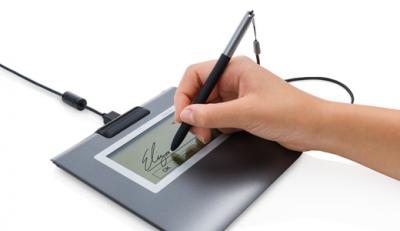
Think You Know Signatures? Well, think again!
Electronic signatures are at the forefront of modern verification technology and, as many paper processes transform into digital workflows and traditional paper documents become PDFs or similar, it would almost seem as if the humble ink signature - the traditional authentication of a person’s identity - is becoming aged and weary.
Signatures have traditionally been a method of demonstrating intent, for example to execute a contract, or as a way of identifying a person is who they say they are, such as the days before ‘Chip and PIN’ where card transactions required a signature verification.
E-Signing and The Legal Question
Signatures show willingness by a person or entity to be bound by a set of agreed terms and consequently such manuscript has become recognised in law as a ‘stamp’ of the signer's agreement. The courts have recognised, however, that a signature is more than just the image produced by one’s handwriting and instead say that the function of signing is what defines a signature: in other words, a signature should demonstrate the signatory’s authenticating intention.
Such recognition by the courts paved way for the use of electronic signatures. Such electronic signatures may be captured as a digital signature (using encryption keys), scanned manuscript, the typing of a name or the ‘ticking’ of a checkbox online. Each of these methods demonstrates the signing party’s intent with varying degrees of certainty, and for the signer the psychological comfort of a traditional ‘pen and paper’ signature is removed.
The biggest legal stumbling block with signatures, however, is proving that a signature belongs to an individual. It is essential that there is evidence to prove that the signing parties are who they say they are in instances of potential identity fraud! Signatures can be forged, both in manuscript and electronically, as an act of fraud. For some unscrupulous parties, a claim that they never signed a document could be an easy way of escaping the terms they’ve previously agreed to; in other cases, the person who makes the signature might not be the person who should be signing - a case of misrepresentation. Whilst witnesses to signatures go some way to preventing such claims, not all documents require such a degree of validation.
This ease of misrepresentation historically presented a problem for those dealing with legal documents. A well understood industry of legal practice has evolved over the past millenium with signatures and seals at the heart of proof of agreement or proof of fraud. If other means of identification, such as fingeprint, are used, how certain can one be of success in a dispute claiming that the signature was made by someone else? No one likes to trail-blaze cases of legal precedent!
The Biometric Value of a Handwritten Signature
Biometric signatures are the solution to such a problem. Using digital capture pads, software will not only capture the signature itself as an encrypted and time-stamped digital image, but it will also record the pressure of the stylus on the pad, the angle at which the stylus is used and the speed at which the signature is written. These biometric characteristics are unique to individuals and reproduced, with a tiny margin of difference, each time that the same individual signs. A visually similar, possibly even identical, signature could be produced on the pad by someone else, but the computer would detect it as a forgery due to the fact that the biometric characteristics of the signature would not match the original signatory. In fact, the visual X-Y data contributes less than 1% of correlation weight in a biometric profile comparison. The true authentication is invisible to the human eye. Similar to, but strong than, a fingerprint, the chances of two people having a matching signature and associated characteristics is miniscule.
Our electronic signing service, SIGNificant, can help you protect the integrity of your documents. Icon UK provides solutions for you to capture forensically identifiable signatures on a range of devices (from signature pads and payment terminals through to iOS, Windows and Android devices of all types) as well as allowing you to control all the steps in the signing process and to verify signatures automatically and in real-time against pre-enrolled profiles for added security.
Additionally, dynamic signatures are one of the only biometrics that vary over time. Every static biometric system, such as iris scanning and fingerprinting may be hacked. Once hacked, the information may be used again and again because eyes and fingerprints do not change. By contrast, a signature, even if hacked, is not reusable since no-one can ever sign exactly the same signature twice in the same manner; signature biometrics are bound to be different from one another when measured accurately enough. Also, even if the user suspects they may be compromised, they can always change a signature and create a new personal profile.
SIGNificant is the only signature verification system capable of ‘intelligently learning’ how users’ signatures change over time. Only this dynamic approach guarantees appropriate results for signature verification and authentication, respectively, because it is human nature never to sign twice in exactly the same way, and also to alter the signature constantly over a life-time. In fact, SIGNificant was found to be the world’s most complete, open and accurate real-time signature verification technology.
To find out more about how you can make signing secure, contact us today.
Icon UK provides Enterprise Document Management, Personalisation and Identity solutions with world class, innovative software products, consultative services and support. Advanced software can transform business process effectiveness with capabilities in the areas of Handwritten Biometric Digital Signatures, Multi-model Biomatrics, Enterprise Document Creation, Content Template Management, Content Service Integration and Multi-Channel Output Management.
The enterprise e-signature platform allows any document that requires a signature to be easily and securely signed on almost any digital device. The solutions have processed millions of electronic signatures around the globe. |


 Connect with us on Linkedin
Connect with us on Linkedin 


 Connect with us on Linkedin
Connect with us on Linkedin 

![]()
![]()
![]()